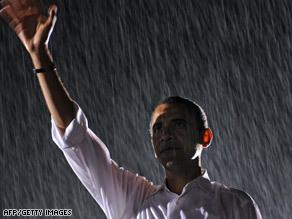Wall Street extended its gains into a fourth session Wednesday, rising moderately after President-elect Obama soothed investors by pledging he would have a plan to deal with the nation's economic crisis on his first day in office.
Stocks that had fallen in early trading on reports of more economic weakness turned higher after Obama stated, "Help is on the way." He spoke as he filled more spots on his economic team.
There was still caution in the market, however, not surprising since Wall Street is coming off three sessions of gains that gave the Dow Jones industrials and the Standard & Poor's 500 index their first triple-session advances in more than two months. Traders were also cautious ahead of what is essentially an extended Thanksgiving holiday weekend; the market is closed Thursday and will have an abbreviated session Friday.
Obama's remarks were calming after the day's economic reports. The Labor Department said initial requests for unemployment benefits fell to a seasonally adjusted 529,000 from the previous week's upwardly revised figure of 543,000. That is lower than analysts' expectations of 537,000. Still, the initial claims remain at recessionary levels.
Meanwhile, the Commerce Department said orders to U.S. factories for big-ticket manufactured goods plunged in October by the largest amount in two years as the economy weakened. The 6.2 percent drop was more than double the 3 percent decline economists expected.
It also reported that sales of new homes fell 5.3 percent in October to the lowest level in nearly 18 years. The seasonally adjusted annual sales pace of 433,000 homes was the lowest level since January 1991, when the country was facing another steep housing downturn.
Americans also cut back on their spending in October by the largest amount since the 2001 terror attacks. The Commerce Department said consumer spending plunged by 1 percent last month, worse than the 0.9 percent decline that had been expected. The report also said personal incomes rose 0.3 percent last month, more than the 0.1 percent gain analysts had predicted.
Analysts said some of the turnaround was also due to the fact that the economic news was expected to be bad.
"What the market might be saying is that investors had been bracing for some of this," said Todd Salamone, director of trading and vice president of research at Schaeffer's Investment Research in Cincinnati, noting that investors have tempered how much spending they expect from consumers. "Expectations have come down, but the big question is if that's rational or not. Certainly the stock market and the credit markets have suggested there might be some rationale in that, but time will tell."
In late morning trading, the Dow industrials rose 35.60, or 0.42 percent, 8,515.07.
Broader indicators also rose. The S&P 500 advanced 3.46, or 0.40 percent, to 860.85, while the Nasdaq rose 30.10, or 2.05 percent, to 1,494.83.
The Russell 2000 index of smaller companies rose 5.30, or 1.20 percent, to 448.48.
Advancing issues outnumbered decliners by 9 to 5 on the New York Stock Exchange, where volume came to 333.1 million shares.
On Tuesday, stocks finished mostly higher as investors were encouraged by new government initiatives to help unfreeze the credit markets. The Treasury Department and the Federal Reserve said they planned to provide $800 billion to aid the market for consumer debt and to make mortgage loans cheaper and more available.
The Dow finished up 36 points, for a gain of more than 900 points across three sessions. The Dow last put a three-day advance together on Aug. 26-28. The S&P 500, meanwhile, had its first three-day rise since Sept. 10-12. Tech stocks lagged and sent the Nasdaq moderately lower as investors feared businesses will further cut back on technology spending.
Still, the market's performance in recent sessions has been a welcome show of stability as stocks have generally traded with less volatility than they had in the past three months as the market's yearlong pullback intensified.
Salamone remains cautious and isn't sure the calm will last.
"I don't think its a sign of longer-term stability, but feel this is a sign of shorter-term stability. There's just too much uncertainty out there," he said.
Bond prices were mixed Wednesday. The yield on the benchmark 10-year Treasury note, which moves opposite its price, fell to 3.00 percent from 3.10 percent late Tuesday. The yield on the three-month T-bill, considered one of the safest investments, rose to 0.05 percent from 0.09 percent late Tuesday.
The dollar mostly rose against other major currencies, while gold prices fell.
Light, sweet crude rose $1.12 to $51.89 a barrel on the New York Mercantile Exchange.
Some of Wednesday's caution was also likely due to uneasiness ahead of the holiday shopping season. The season, which accounts for as much as 40 percent of annual profits for many stores, is expected to be the weakest in decades, as consumers grapple with rising unemployment and a drop in household wealth.
Some consumer technology names managed to post gains as investors hoped they might be able to see post holiday results.
Apple Inc. rose $3.49, or 3.8 percent, to $94.29, while Dell Inc. rose 49 cents, or 4.7 percent, to $10.91. Sprint rose 22 cents, or 9.4 percent, to $2.55.
Blue chip stocks were mixed. Consumer products maker Procter & Gamble Co. fell 70 cents to $62.48, while Chevron Corp. rose $1.06 to $77.59.
Overseas, Japan's Nikkei stock average fell 1.33 percent. In afternoon trading, Britain's FTSE 100 fell 2.10 percent, Germany's DAX index fell 1.37 percent, and France's CAC-40 fell 2.03 percent.
'Business' 카테고리의 다른 글
| China Takes An Ax To Rates (0) | 2008.11.27 |
|---|---|
| New jobless claims drop from 16-year high (0) | 2008.11.27 |
| Holding A Candle To Buffett (0) | 2008.11.27 |
| Layoffs And Lawsuits (0) | 2008.11.27 |
| China Hacks At Rates (0) | 2008.11.27 |



